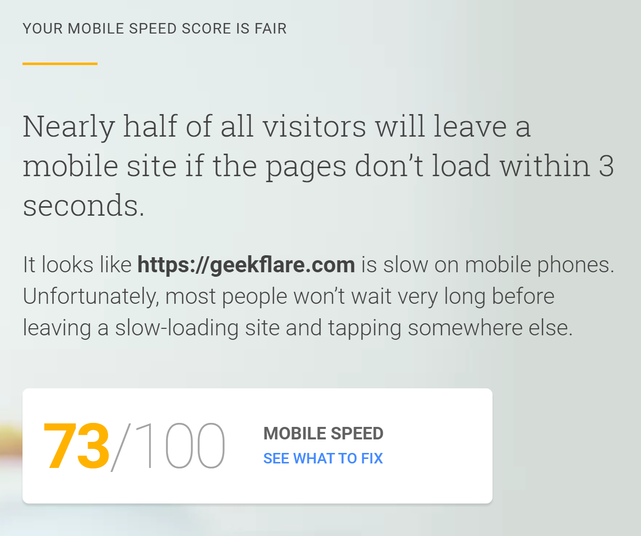Do you know the speed of loading your site from mobile devices? Time to figure it out

Find out how long it will take to load the page on mobile devices from different regions.
Mobile phones are always with you, and more than 50% of Google search requests are made through mobile devices. According to the latest Hitwise data, more than 65% of requests in the categories “Food and Drinks”, “Health” and “Sport” come from mobile devices.
Designations on the chart:
Share of requests from mobile devices in the total number of searches by industry:
')
- Food and Drink - 72%
- Health - 68%
- Sport - 68%
- News and media - 64%
- Lifestyle - 62%
- Cars - 62%
- Retail - 56%
- Tourism (not maps) - 52%
- Real Estate / Land - 48%
- Leisure - 42%
- Banking services - 39%
Based on the most popular variants of search results with the subsequent transition to the corresponding sector, April 10, 2016 - May 7, 2016. Source: Hitwise, a division of Connectivity.

Have you already prepared your site for mobile users?
Creating a mobile version of the site - the key to success, and for good reason.
The speed of the mobile Internet (2G / 3G / 4G) is lower than the speed of a broadband or fiber-optic network. That is, the site can load faster on a computer than on a mobile device.
Therefore, it is necessary that the site is optimized for mobile devices, that it is adaptive , and that there is a mobile version of the pages.
According to Google, the following is known:
- the probability that the page is left is five times higher if the site is inconvenient to use;
- about half of the users leave the site if it does not load in 3 seconds.
Perhaps you should consider the following options for optimizing your website for mobile devices.
Forward for adaptability! On responsive websites, page elements, such as images, adjust to the overall page size so that they match the diagonal and device resolution and are convenient for visitors.

It’s impossible for anyone to optimize for mobile devices . Google takes this into account in the search rankings, so your task is to make the webpage work perfectly on mobile phones and other gadgets.
Now for the tool overview.
List of tools:
Mobitest
AKAMAI 's Mobitest allows you to check the download speed of a site from mobile devices in the following cities:
- London;
- Bangalore;
- Cambridge.
You can choose from a variety of devices: iPhone, Nexus, Galaxy S5, iPad, Kindle Fire HDX, etc.

Most tools allow you to check once per launch. Mobitest can perform up to three checks per cycle.
Upon completion of the test, you get the average load time , page size and, if you are interested, just below are invited to examine the results presented in the form of a cascade graph .

Think with Google
Test My Site from Think with Google does not give the exact load time, but there is a benefit.
It checks the convenience of the site when viewed from mobile devices according to the criteria below and gives an estimate on a 100 point scale:
- matching content size for the viewing area;
- setting the viewing area;
- the size of the active elements on the page;
- font size;
- availability of plugins.

Try to score at least 100 points.
Then you will see an estimate of the download speed on mobile devices , but not the elapsed time itself.

The rating is determined based on the following factors:
- minimizing CSS , JS & HTML;
- server response time;
- compression ;
- caching in the browser;
- image optimization ;
- the presence of JS and CSS, blocking the display of the upper half of the visible part of the site;
- prioritization of content.
GTmetrix
GTmetrix is the most popular tool for measuring website download speeds for computers. If you pass the free registration, you can also check for mobile devices using the Chrome browser.
Currently, with free registration, verification for mobile browsers is only available in Canada.

You get the test results for the same indicators and in the same form as for stationary devices:
- PageSpeed and YSlow score;
- load time;
- page size;
- the number of HTTP requests;
- cascading schedule.
If you don't mind registering, then with GTmetrix you will get useful results that you can immediately take into account in your work.
SynTraffic
SynTraffic checks the page on mobile devices in the following regions:
- East Coast USA;
- West Coast USA;
- Australia;
- Western Europe.
The results of the SynTraffic check are very similar to GTmetrix, the format and design differ. This is a worthy alternative to GTmetrix. The test results contain the following:
- the total number of requests sent;
- YSlow score;
- PageSpeed score;
- total loading time of the page;
- % completed / failed requests;
- the number of requests by domain, content type, size and time;
- cascading graphics.

Dotcom monitor
Dotcom Monitor has the widest selection of check regions: there are a total of 24 .

Dotcom Monitor checks for a variety of device types, such as:
- iphone
- iPad
- Android
- Nokia Lumia
- Blackberry
After the test, you can view the average result or a cascade graph for each region.

Each report has a summary, performance analysis, query schedules, host and error data, if any. Looks promising, I liked it.
The whole world becomes mobile . I advise you to do everything possible to optimize the site for mobile devices.
If you are not using CDN services, for example, MaxCDN, CloudFlare, Incapsula , then it's time to think. A number of options for optimizing the operation of the site are available on their network peripherals.
Well, on HOSTING.cafe you will find hosting and virtual servers to host your projects .
Source: https://habr.com/ru/post/324504/
All Articles